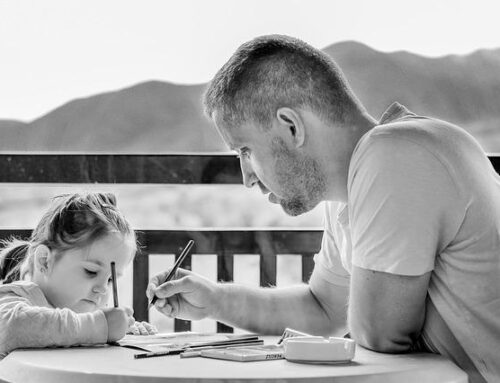The truth is- no one likes to open their emotional self to a robot….Or a brick wall for that matter. We, as therapists, are SO much more than a… “uh, huh..and how does that make you feel?” I cringe when I hear people say:
“I don’t think my therapist really cares..”
or
“My therapist doesn’t really say anything, I just talk..”
and
“I just don’t feel like my therapist and I connect.”
…Sigh…
BUT— We do care. We do feel…. And it’s time to bring our ‘whole’ selves into the experience- unapologetically.
Too often, our education emphasizes strengthening our ability to engage others with empathy, but in the same breath tells us to inadvertently check ourselves at the door. I think we all have learned to some degree that empathy is a blessing and a curse. Too much empathy is often a risk factor for burnout; too little empathy leaves us offline to the process. So, where do we find balance? How do we give permission for our ‘whole self’ to show up? – And why on earth is this important?
We cannot expect our clients to step into their full emotional capacity when we leave the very essence of ourselves out of the process.
I’m not talking about turning the discussion onto us- that’s a given, but we need to find a way to show up -WHOLE HEARTEDLY- and lean into the most important aspect of our human experience… a genuine, authentic human presence. From my experience as a trauma therapist, supervisor, and consultant- the power of the work lies in that.
Let’s face it, we as therapists, are HUMAN! We laugh, cry; feel happy, sad, angry; have complicated grief; struggle with emotional pain; make mistakes; and experience life blessings and utter challenges- just like those who we invite into our professional space. We can’t hide the fact that we experience life just as much as our clients do, and that’s okay. Sometimes, all our clients need to see is a natural, unprompted human response. That, my fellow colleagues, is NOT something learned from a textbook.
Let’s talk authenticity in some key principles….
#1- We need to remember the “why” behind our work. We all carry a unique story behind why we wanted to be a therapist. Do you remember yours? If not, it’s time to do some self-reflecting. Likely, the answer is stored in your emotional self, and if you are lucky enough to have quick access to that, then you are already ahead of the game for principle #2.
#2- Vulnerability: Brene’ Brown states, “Vulnerability is the best measure of courage.” The epitome of courage in our work is the ability to show up, as our whole self, unapologetically. There is no “showing up” to this process without leaning into vulnerability. If tolerating uncertainty in the therapeutic process is uncomfortable, that becomes a great place for you to dig into some of your own work (remember…we are human, too!).
#3- Self-awareness: To be fully conscious of our emotional and physiological state while tracking that of the human in front of us is a superpower. This requires the ability to stay present, moment to moment, and creates the space to bring in our presence, too.
#4: Self-attunement: When we are plugged into our experience in real time, it allows us to “feel and deal” while managing the person’s struggle in front of us. This principle cannot be carried out without Principle #2.
#4: Affective Competence: This is a term used to define a secure attachment, which in trauma work, is a vital component to co-construct with the client. This means having the ability to develop comfort and safety in the relational dynamic between ‘self and other.’ It requires emotional flexibility and the ability to stay fully present in real time, and if that results in a tear that falls down your cheek while deeply in the process with your client, then so be it. (Hey- isn’t that equivalent to bringing your human to the process?).
#5: Flexibility: We need to be adaptable to the needs of our clients, and the only way to do this is by having a strong sense of self-awareness in the process (yep, Principle #3). How we show up absolutely matters in the therapeutic space. Our relationship with our clients creates the conditions for change and transformative healing. If we can’t be flexible with our clients, the therapeutic relationship becomes compromised. Real talk- treatment outcomes rely much more on the therapeutic relationship than any therapeutic approach. So- if you need more flexibility, get to stretch’n!
#6: Integrity: Honesty and consistency are core values for us not only as therapists, but humans. When we are talking about authenticity, we do not want to leave this out of the room….
#7: Intention: Show up. With your whole self. On purpose. — Every time.
Intentionality grows from our core self. It’s a commitment, not only to those we work with but to the innermost layer of your “why.” With intention comes purpose. If you listen closely, that becomes your guide…and there is nothing more authentic than that.
When we can show up authentically, our clients can feel into it- and THAT creates the conditions for them to step forward, be brave and approach the process. So- I invite you to step into YOUR full capacity and lean into the power of your human in this work. Embrace who you are, not who you think you need to be, and use it intentionally. The work you set out to do using your ‘human’ will impact the process deeper and much more meaningfully. Your clients will thank you. I promise. <3





Leave A Comment